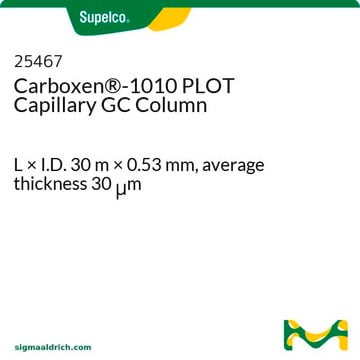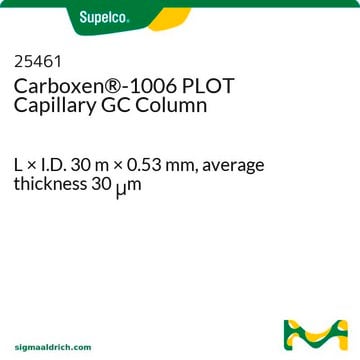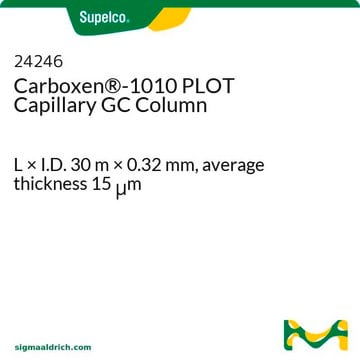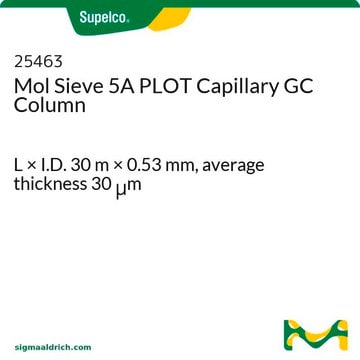24241-U
Carboxen®-1006 PLOT Capillary GC Column
L × I.D. 30 m × 0.32 mm, average thickness 15 μm
Synonym(s):
GC column, PLOT, Carboxen 1006
Sign Into View Organizational & Contract Pricing
All Photos(1)
About This Item
UNSPSC Code:
12000000
NACRES:
SB.54
Recommended Products
material
fused silica
description
PLOT = Porous Layer Open Tubular
manufacturer/tradename
Carboxen®
parameter
≤25-250 °C temperature (isothermal or programmed)
average thickness
15 μm
df
15 μm
technique(s)
gas chromatography (GC): suitable
L × I.D.
30 m × 0.32 mm
matrix active group
Carbon molecular sieve phase
application(s)
chemicals and industrial polymers
food and beverages
column type
capillary PLOT
Looking for similar products? Visit Product Comparison Guide
General description
Porous-layer open-tubular (PLOT) columns are a powerful tool used in gas chromatography for analysis of fixed gases, light hydrocarbons and volatile solvents. They are mostly preferred over traditional columns.
Application: This column is ideal for the separation of many permanent gas components (such as helium, hydrogen, nitrogen, carbon monoxide, methane, and carbon dioxide), and light hydrocarbons (C2-C3) in the same analysis. It is ideal for resolving formaldehyde/water/methanol (formalin) mixtures and monitoring impurities in ethylene. This column can be used with high flow rates and rapid temperature programs to ensure excellent, fast separations.
USP Code: None
Phase:
USP Code: None
Phase:
- Carbon molecular sieve
- Subambient to 250 °C (isothermal or programmed)
Application
- Carboxen® 1006 PLOT capillary column may be used as an extraction device in liquid chromatography-mass spectrometry (LC-MS) coupled with in-tube solid-phase microextraction, used in order to determine patulin in dried fruit samples and fruit juice.
- Carboxen®-1006/polydimethylsiloxane(PDMS) fiber mounted in an SPME manual holder assembly coupled with GC-MS may be used for testing lipid oxidation products in milk.
- It may also be used as an extraction device in liquid chromatography-mass spectrometry (LC-MS) coupled with in-tube solid-phase microextraction, in order to determine ochratoxins A and B in nuts and grain samples.
Other Notes
We offer a variety of chromatography accessories including analytical syringes
Legal Information
Carboxen is a registered trademark of Merck KGaA, Darmstadt, Germany
Choose from one of the most recent versions:
Already Own This Product?
Find documentation for the products that you have recently purchased in the Document Library.
Porous layer open-tubular capillary columns: preparations, applications and future directions.
Journal of Chromatography A, 842 (1), 115-142 (1999)
R T Marsili
Journal of chromatographic science, 37(1), 17-23 (1999-02-13)
A sensitive, rapid procedure for testing lipid oxidation products in milk is developed using solid-phase microextraction (SPME) and gas chromatography-mass spectrometry. SPME is as sensitive as dynamic headspace (DH) analysis for measuring the pentanal and hexanal produced in milk after
H Kataoka et al.
Journal of chromatography. A, 1216(18), 3746-3750 (2009-03-25)
A simple and sensitive method for the determination of patulin in fruit juice and dried fruit samples was developed using a fully automated method consisting of in-tube solid-phase microextraction (SPME) coupled with liquid chromatography-mass spectrometry (LC-MS). Patulin was separated within
Dawn M Chapman et al.
Journal of agricultural and food chemistry, 52(17), 5431-5435 (2004-08-19)
A rapid and automated solid phase microextraction (SPME) stable isotope dilution gas chromatography/mass spectrometry (GC-MS) method for 2-methoxy-3-isobutylpyrazine (MIBP) quantification in red wine was developed. Wines with 30% (w/v) NaCl and 2-methoxy-(2)H(3)-3-isobutylpyrazine internal standard were sampled with a 2 cm
Louise Urruty et al.
Journal of agricultural and food chemistry, 50(11), 3129-3136 (2002-05-16)
To provide an efficient and running analytical tool to strawberry plant breeders who have to characterize and compare the aromatic properties of new cultivars to those already known, a HS-SPME/GC-MS analysis method has been coupled with a statistical treatment method
Our team of scientists has experience in all areas of research including Life Science, Material Science, Chemical Synthesis, Chromatography, Analytical and many others.
Contact Technical Service





